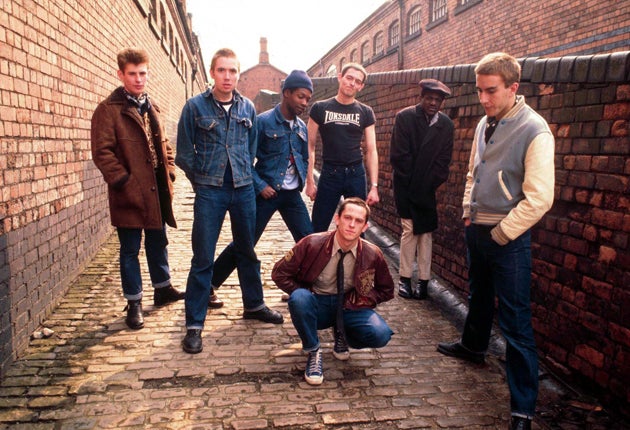Let's kick against the Eighties revival
Will the resurgence of the Tories prompt any decent protest music? DJ and journalist Ian McCann certainly hopes so

Your support helps us to tell the story
From reproductive rights to climate change to Big Tech, The Independent is on the ground when the story is developing. Whether it's investigating the financials of Elon Musk's pro-Trump PAC or producing our latest documentary, 'The A Word', which shines a light on the American women fighting for reproductive rights, we know how important it is to parse out the facts from the messaging.
At such a critical moment in US history, we need reporters on the ground. Your donation allows us to keep sending journalists to speak to both sides of the story.
The Independent is trusted by Americans across the entire political spectrum. And unlike many other quality news outlets, we choose not to lock Americans out of our reporting and analysis with paywalls. We believe quality journalism should be available to everyone, paid for by those who can afford it.
Your support makes all the difference.In a lot of respects, I had a great time under Thatcher. Under her rule, I became a music journalist; DJed at the Wag; met James Brown (the soul Godfather, not the Loaded founder); most of all I shook off the apparently dying rhythm of rock'n'roll and made a part-time passion for black music into a full-blown obsession.
But having also endured a period of homelessness back then and watched yuppies taking over areas of London I loved, the last thing I would like to see under the Tory-led coalition is an Eighties revival, musical or otherwise.
For left-leaning musicians, Thatcher should have been a gift, a ready-made enemy arriving hot on the heels of punk. At first, there were musical protests: The Pop Group's "We Are All Prostitutes", The Beat's "Stand Down Margaret" ("Stand Down Margaret, stand down pleeeease" – as if) and any number of gigs in support of the striking miners; I played some on a bill that included the punk poet Attila the Stockbroker. But the musical dissent didn't last and somehow Thatcher managed to cling on to power despite the efforts of Red Wedge – a leading light of which was a reformed Paul Weller, who had supported the Tories in 1979. For many people, myself included, it a case of "dance before the police come" as Shut Up and Dance succinctly put it, at warehouse parties where you and your awful pleated trousers could forget the brave new Tory world.
There were few reminders of politics on the mid-1980s dance floor and soul music did not try to address society's ills in the mid-Eighties. Tony Blackburn was a top soul DJ, along with the now-forgotten Steve Walsh, who was big in every sense, and the pirate jocks were mostly about having it large like their fans. Chants of "woh-oh" to Maze classics, fine; chanting down the Falklands War, forget it. Amid all this, Paul Hardcastle's "19", released just 10 years too late for the Vietnam War, which was its subject matter, came across like the era's "We Shall Overcome" – for about two months. Meanwhile, reggae's protest era had been abandoned at the end of the 1970s, with occasional exceptions and rap's rebellion was more musical than verbal back then.
As for pop's protests at the new Tory era, it is hard to see where they might emanate from. The Beat were a major chart act when they implored "Stand Down Margaret". Would Keane or Florence and the Machine do the same? I can't see it happening: much of current pop is musical conservatism. For Madge, read Lady Gaga, for Rick Astley we have Justin Bieber. For The Specials, we have ... The Specials, which is perhaps the saddest indictment of all. But there are some loosely politicised potential stars on the horizon. The hip-hopper Akala, recognised with a Mobo in 2006, is realising his potential as a thoughtful observer of, uh, Broken Britain on his Double Think album. The Supernovas' "Slaughter in the Gaza" proves that an outfit of mixed heritage that is every bit as pretty as any contrived boy band can rock with intelligence. Their label mates Krakatoa are aiming to change their industry with "Rock'n'Roll Revolution", which moans "They're singing about nothing when there's so much you can say". Whether their 1960s-mod inflected sound can be described as revolutionary is a moot point, but if anyone is going to put the desert boot into the Coalition, it's them.
Paul Weller, too, hasn't forgotten social comment. A couple of songs on his latest album lament the growth of computer-mediated personal interaction. And there's "history" between him and David Cameron. When the PM declared "The Eton Rifles" one of his favourite songs, Weller sniped: "Which part of it didn't he get? It wasn't intended as a jolly drinking song for the cadet corps."
So from me, a cautious welcome for a new musical era; art changes when society changes. I'll be pressing my pleated pants anew – back in fashion just in time, I'm told.
Join our commenting forum
Join thought-provoking conversations, follow other Independent readers and see their replies
Comments